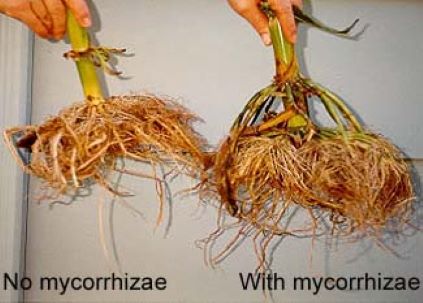By David Wall, Mount Pleasant Master Gardener
Quite often we hear about the benefits of mycorrhizae, but seldom do we get a good understanding of what they are, how they help, and how they do it. Basically mycorrhizae support nearly all vegetable plants, the exception being members of the brassica family (Cabbage, lettuce, etc.).

of Nevada Reno Cooperative Extension)
Mycorrhizae are fungi, but more than that, beneficial fungi. These fungi attach themselves to the root system of your vegetables (this also included trees). They create threads by chaining together, and though microscopic, can extend for large distances – anywhere from twice to as much as several times the distance as roots would normally extend, thus greatly increasing the food possibilities for the plant.
Your vegetables generate food (sugars) through photosynthesis, which is sent to the roots for storage and future food for the plant. Anywhere from 50% to over 70% of this stored food is made available to mycorrhizae which, in turn, provide nutrients gathered from the soil to the roots. The result is a symbiotic relationship in which both gain from the relationship.
BY FAR the best way to feed your plants is to feed the soil (mycorrhizae) and let the soil feed the plants. Using synthetic fertilizers shortcuts the process and feeds the plant directly. The result is weakened/degraded soil and loss of major portions of the synthetic fertilizer due to leaching down into the water table where they can begin their journey to the Gulf of Mexico.
Using organic fertilizers directly feeds mycorrhizae who then feed the plant. Further, organic fertilizers degrade slowly enough so that mycorrhizae can gavther all the nutrients, leaving nothing for that long trip to the Gulf!
Every time you till or break up the soil, you kill gazillions of mycorrhizae which then take considerable time to rebuild, thus degrading their ability to feed the plant.





